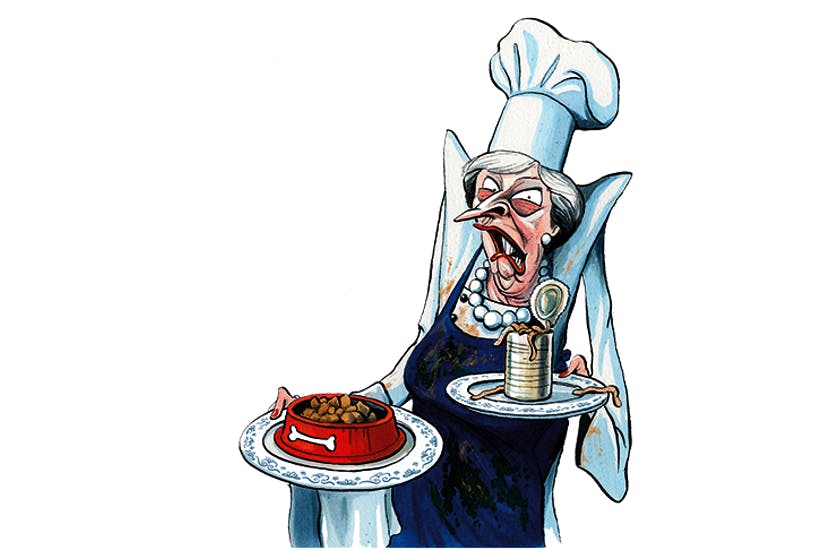During last year’s general election campaign, Theresa May declared that ‘You can only deliver Brexit if you believe in Brexit’. Unfortunately, her deal proves this point. It was negotiated by a team of people who imagined their job to be a damage-limitation exercise. They did not see Brexit as an opportunity and this is reflected in the terms put before the cabinet.
The deal falls far short of what was promised in May’s Lancaster House speech. She said she’d bring back a clean Brexit, taking Britain out of the Single Market, the Customs Union and the jurisdiction of the European Court of Justice. The deal she ended up presenting to her cabinet will, in several important regards, fail all of these tests. But May has conveniently forgotten her tests. She doesn’t mention them any more. Instead, she talks about the uncertainty that might be unleashed by no deal (as a result of her failure to prepare for it) and the political weakness created by the result of the general election she called last year.
She will now be tempted to turn parliamentary approval of the draft Brexit deal agreed on Tuesday into an issue of confidence. She will be inclined to tell MPs that whatever they think of this deal, it is the only one on the table and the only thing separating us from a chaotic departure from the EU on 29 March next year. Either accept it, or the government will collapse and Jeremy Corbyn will be prime minister.
This is a tactic which May should be careful to resist. It was tried by John Major with the Maastricht Treaty in 1993, and in the strict sense of allowing the then prime minister to complete the passage of his bill, it may seem initially to have worked. But the price Major paid was to create a poisonous atmosphere in the Conservative party which resulted in a calamitous defeat four years later. And in 1993, Sir John still had a majority of nearly 20. Theresa May has none.
Already, the DUP MPs who provide her majority have indicated they will oppose the deal. Their concerns will be shared by Scottish Tory MPs who recognise that a weaker union with Northern Ireland might erode that between England and Scotland. At first sight, the deal does away with the need for an internal customs border between Northern Ireland and the rest of the UK. But the small print shows that the EU is, in effect, being given jurisdiction over goods standards in Northern Ireland. The fear is that if the UK later wants to make a clean break with the EU, it would have to leave Northern Ireland behind.
No. 10 disputes this interpretation, but this brings us to the largest single problem with Mrs May’s deal: we would not be able to leave it freely, at a time of our choosing. It would only be possible with the permission of an ‘independent arbitration committee’. This is exactly the state of ‘vassalage’ which Remainers and Brexiteers alike have been warning about.
Brexit was never, in itself, going to be a guarantee of national success. It represented the removal of a constraint: making it work would require using the UK’s new freedoms wisely. But the UK will have almost no new economic freedom under these arrangements. The UK will not be able to become a more competitive economy 20 miles off the Continent’s coast, competing for investment with the promise of lower taxes, freer trade and a more streamlined regulatory environment that ditches the precautionary principle. Instead, the UK will be bound by level playing field restrictions designed to ensure that this country can gain no competitive advantage over the EU27.
May’s deal is not useless. It does bring back control of borders, farms, fish and money. Payments to the EU will fall from about £10 billion to less than £1 billion, saving some £50 billion over a parliament. We will be free from the Common Agricultural Policy which has, over the years, done so much to exacerbate Third World poverty. It will stop our courts having to look to Strasbourg for direction, protecting the common law tradition on which our justice system (and the respect for it) is based. For those to whom Brexit was about immigration and money, both boxes are ticked.
But to those for whom Brexit was about sovereignty, and the ability of Britain to manage its own affairs for a 21st century that requires a global outlook rather than European parochialism, this deal is a bitter disappointment. We will not, really, be able to break free from EU protectionism. We will end up accepting regulatory diktats under the guise of ‘level playing field’ requirements. We will not be able to strike new trade deals, to the dismay of Americans and Australians who had hoped for closer relations with us — and to the dismay of millions who voted for Brexit, with all its risks, but now find the government unable to share their confidence in the project of the United Kingdom.
This is why May will struggle for parliament’s approval. MPs from all parties will know that there is a better way of doing this. And that even now, it is not too late to find one.






Comments